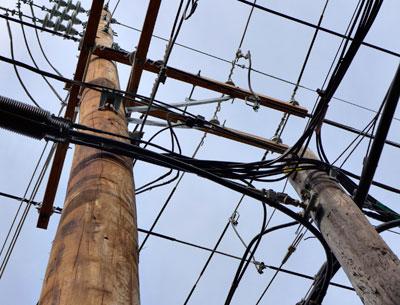Lawmakers Push Penta Ban

The use of utility poles coated with pentachlorophenol, such as those recently installed by PSEG Long Island in East Hampton and Amagansett for a controversial six-mile high-voltage transmission line, would be banned in New York State under legislation proposed this week by State Senator Kenneth P. LaValle and Assemblyman Fred W. Thiele Jr. The industrial wood preservative has been banned in countries worldwide.
The draft law also calls for warnings to be posted on existing poles treated with the chemical, called penta — a step that a local activist group, Long Island Businesses for Responsible Energy, which has sued PSEG over its transmission line here, called for recently in visits to the East Hampton Town and Village Boards.
Representatives of the group, called LIBFRE, also reported to the boards on the results of recent water tests at the East Hampton Village Emergency Services Building on Cedar Street. The new utility poles have been installed along Cedar Street, and penta was detected in recent tests of water from the building. The water was drawn at the village’s request from a sump in the basement of the building, a source not used for drinking water and not considered potable, Rebecca Molinaro, the village administrator, said this week.
Village officials are reviewing a request by LIBFRE to conduct additional water tests by drilling down into groundwater, she said.
In a joint press release with Mr. LaValle, Mr. Thiele said that “at a time when we are all focused on the degradation of our water, it is inconceivable that wood treated with this substance would be permitted to leach into the groundwater on Long Island. There are better options and those options should be implemented now.”
The release provided federal Environmental Protection Agency information regarding pentachlorophenol, or PCP, and its toxicity. It has been classified by the agency as a “probable human carcinogen.”
The chemical has been outlawed for use by the general public, Mr. Thiele said, yet “has been used to treat utility poles for transmission lines in places like East Hampton that are only a few feet from residential dwellings, exposing children and families to this dangerous substance.”
“This is a critical public health and safety matter,” Mr. LaValle said in the release.
